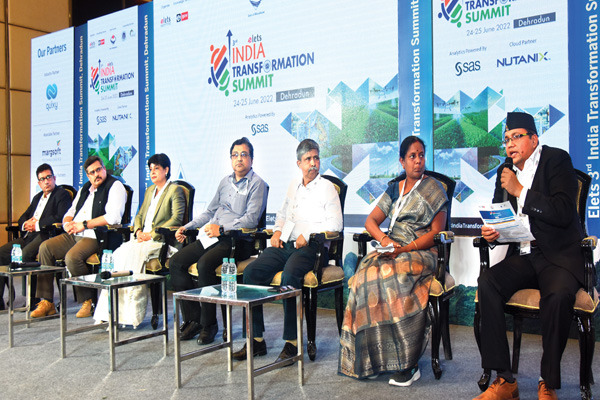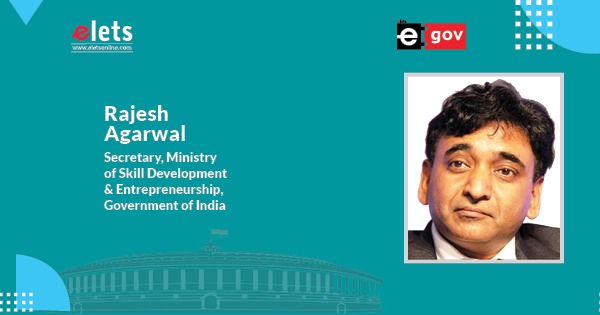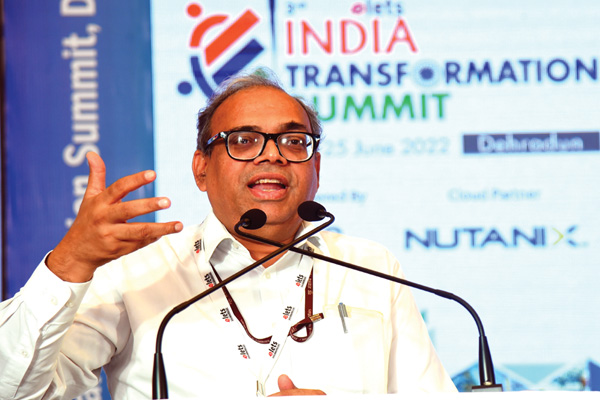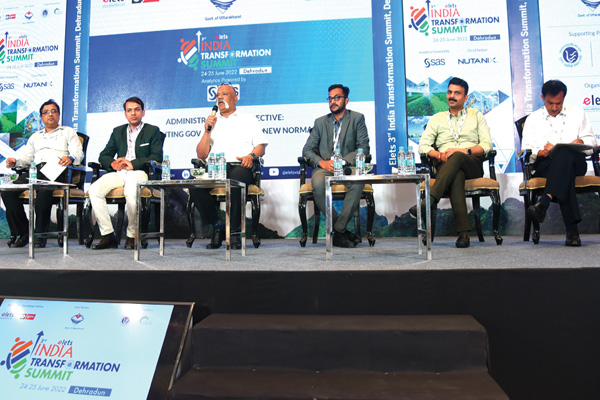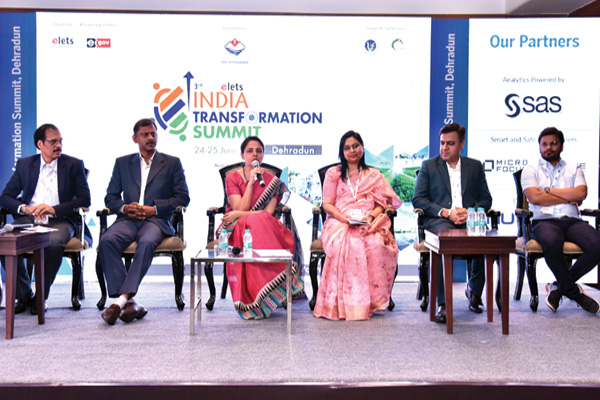
Government departments have so much data. The challenge that they face is how to harness it for the department’s own good. Highlighting this, Dr. Roshan Jacob, Secretary, Department of Mines & Geology, Government of Uttar Pradesh; Kranti Khobragade, Deputy Director, Income Tax, Intelligence and Criminal Investigation, Government of India; Binu Francis, Commissioner, Thiruvananthapuram Municipal Corporation, Kerala; Padmakar Kulkarni, Additional Commissioner, Commercial Taxes Department, Government of Karnataka; Ajitesh Pandey, Additional Chief Executive Officer, Chhattisgarh Infotech Promotion Society and Kunal Sama, Principal Sales Specialist SAS India, spoke at the Elets India Transformation Summit.

Dr. Roshan Jacob, Secretary, Department of Mines & Geology, Government of Uttar Pradesh
Dr. Roshan Jacob, Secretary, Department of Mines & Geology, Government of Uttar Pradesh, elaborating on the focus areas of the mining sector said, “The broad mandate for the sector would be to maximise legal mining so as to facilitate public access to minerals at affordable rates, maximising revenue for the government through better mineral management, curbing unscientific and illegal practices of mining and transportation to create a cleaner ecosystem and creating a platform which will onboard all stakeholders, to create transparency and ease of doing business.”
Each area has its constraints, she said. “In mining, the government operates in multiple and at times conflicting roles. We have the government as a revenue earner, as an enforcing agency, as a supplier and also as a buyer,” she added. Jacob said that these roles complicate the picture because too much emphasis on one sector destroys the balance of the sector.

Dr. Jacob talked about Mining being a very opaque sector. “Due to market monopolies and nexuses operating, there is a lack of parity in the sector, to the point where upcoming entrepreneurs feel a little shaky to enter it,” she said.
Over the last three years, the department has been trying to put together a one-stop-shop, the UP Mine Mitra. “It is a citizen portal and all the services given by the Department of Mining to the average citizen are there – every kind of permit, permission, lease, licence. At another level, it is an industry interface. Whatever our concessionaires have to deal with, it is all there – LOI, mining plan, payments, transit pass,” she said.

She then talked about UP’s ecommerce platform – UP Mineral Mart, which gives a direct buyer-seller interface between all the sellers in the state and people who want to purchase the mineral.
Highlighting the more relevant components, she said there is an Integrated Mining Surveillance System, which tries to curb illegal mining and transportation to real- time surveillance of data and reporting and the other being Lease Information Management. She concluded by saying, “I would say better resource management is possible, which translates into better revenue for the state.”

Kranti Khobragade, Deputy Director, Income Tax, Intelligence and Criminal Investigation, Government of India
Income Tax is a sector with voluminous data. Kranti Khobragade, Deputy Director, Income Tax, Intelligence and Criminal Investigation, Government of India, highlighted how the department extracts actual intelligence output from a high volume of data, considering the fact that it deals with things which have to be addressed in a certain frame of time and how it is slowly moving towards AI and machine learning (ML).
Khobragade highlighted the revenue that was collected last year and an increase in the number of people filing ITRs. “Income taxes collected 14 lakh crore of income tax in the financial year ending 2022, which is the highest till date,” she said.
“In the quarter which ended on June 30, we saw an increase in collection of income tax of nearly 45 per cent as net tax collection and 30 per cent in advance tax collection. We had 7.14 crore people filing income tax returns as against 6.9 crore, which is of previous year,” she added.
She explained the reasons for the increase in tax growth. “These reforms which have been made in the department’s functioning, as well as the economy that is seeing growth, is the reason for increase in tax growth,” she said.
Khobragade talked about the changes the Income tax department has undergone in the last 3-4 years and how everything has become faceless post COVID. “We implemented the faceless scheme in 2020, so all the assessment that is being carried out is faceless. Not only assessment, but also appeals, penalties, settlement, commission, and advance ruling,” she said.
“We are focusing more on being a service-oriented organisation, so that more voluntary compliance takes place and a lot of people pay tax on their own,” she further said.
Khobragade highlighted the increasing use of technology in the Income Tax department and the move to use AI and ML. “Income tax has increased the use of technology and reduced the use of manual work,” she said.
“There are billions of transactions which are impossible to look into and verify and that is why Income Tax has moved to use AI and ML. To capture all this data, various risk management strategies have been developed by the department, to identify the data which is actually important and which would result in increasing the tax collection,” she concluded.
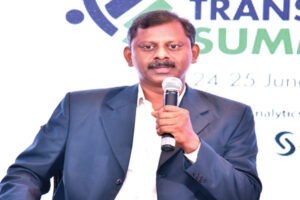
Binu Francis, Commissioner, Thiruvananthapuram Municipal Corporation, Kerala
Binu Francis, Commissioner, Thiruvananthapuram Municipal Corporation, Kerala, talked about TMC’s financial model and how the corporation uses data to create actionable intelligence to improve its revenue performance and service delivery.
“In Kerala, we have a Information Kerala Mission, which is an autonomous body made by the state government, which develops software, monitors and manages all kinds of datas, including all kinds of activities that are for panchayats, block panchayats, municipalities or corporations,” he said. “We have another software called ‘Sanchaya’, where all the data of assessment properties are collected and put in the system and itself, it will create a demand and will monitor who are the defaulters and who are the assessees,” he added.
Francis said that the corporation has developed an app- Smart Trivandrum App- whereby those who want water or septage service have to raise a demand in the app. This has three advantages, he said. “One is, we can ensure that the water is collected from the authorised vending point. Second is, they are not charging more than what we have fixed. The third one is we can generate Rs 100 as the user charge for a trip,” he added.
“So, social benefit is there, we can regulate it and we get an added advantage of revenue. This is the beauty of e-governance or IT platform,” he concluded.
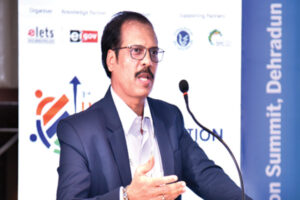
Padmakar Kulkarni, Additional Commissioner, Commercial Taxes Department, Government of Karnataka
Elaborating on the journey of Karnataka Commercial Tax Department, Padmakar Kulkarni, Additional Commissioner, Commercial Taxes Department, Government of Karnataka, said, “Till 2005, we had Karnataka Sales Tax Act, where returns were filed manually and tax was levied on single point, as in all other states. Our computerisation started way back in the 90s, but it was very limited.” “In 2005, we started a massive computerisation of the Commercial Tax Department, but the returns were filed manually as we were feeding the data into the system,” he added.
In 2010, the department brought e-filing and e-payment simultaneously. Later, it introduced e-Way Bills, that is the delivery note and called it ‘e-Sugam’. “What has been adopted by GSTN in 2018, e-Way Bill is a refined form of e-Sugam, introduced by Karnataka,” he said.
Under GST, the threshold limit is 20 lakh for services and 40 lakh for goods. To identify the potential taxpayers, Kulkarni said that the department is using its own analytical tools, like e-Way Bill analytics. “For registered dealers, we have GST-Prime, developed by Karnataka Commercial Tax Department with NIC, which has been adopted by 20 states across India,” he said.
“We are doing sectoral analysis of commodities, revenue forecasting, finding the circular trading, top defaulter identification. We have categorised the dealers into top, mid and other category. Based on that, every month after 20th, our officers issue 3A notices, then the assessment of non-filers and recovery measures, he concluded.
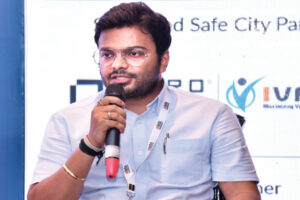
Ajitesh Pandey, Additional Chief Executive Officer, Chhattisgarh Infotech Promotion Society (ChiPS)
Ajitesh Pandey, Additional Chief Executive Officer, Chhattisgarh Infotech Promotion Society (ChiPS), talked about the technology-led innovations ChiPS used to spearhead revenue collection and bring transparency.
“We are working for IT solution for all the departments. Whenever we create Ease of Living for the people, it creates revenue as a by-product. Secondly, as a government, we should curb the leakages, which were earlier happening without any IT program or products, that again will create revenue,” he said.
During the pandemic, when everything was closed and people were not able to avail services, ChiPS developed a telemedicine kind of thing – CG Haat Bazaar Clinic – a platform to provide raw materials like vegetables, medicine, directly to the consumer, Pandey said.
Recently, the Chhattisgarh government launched a program known as ‘Mitan Yojana’. “Under this, the civil services are delivered to the home. People can get home access to birth certificates, marriages, residence, income, death certificates and other services,” he said. “Chhattisgarh state received a national e-Governance award for ‘Khanij Online’, a web-based mines & minerals management system, which helps in E-Transit pass, filing of applications, payment of taxes and filing of Online returns,” he concluded.
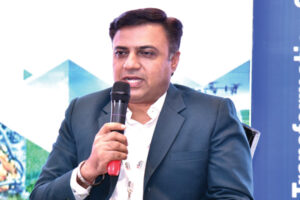
Kunal Sama, Principal Sales Specialist SAS India
Kunal Sama, Principal Sales Specialist SAS India, explained how the public sector can increase transparency and efficiency in revenue management. “Technology would always be in a catch-up mode. We can only do so much of what we can think of. But the people who want to play around with the system would essentially be a step ahead. They would find their newer ways in order to either avoid or evade taxes, which could cost the exchequer, the state, a lot of hard burns in terms of loss of revenue,” he explained. “Those are the places where we, as a technologist, would always encourage people to come up, and find newer ways,” he added.
Highlighting the reason why Artificial Intelligence and Machine Learning are catching up in importance, Sama said, “Everything has to learn by itself and if the system can start learning by itself, they would essentially start to be a little proactive.”
Sama explained how SAS helped Rajasthan to change certain terms of the state’s policies they had in their exercise department. “They had an excise policy of having a 50-50 lifting pattern for the dealers, licencers, in terms of the country liquor and RML. We suggested they change that from a 50-50 to 70-30, because their inventories were showing so much that essentially it would have impacted in the next year for the licences to get renewed itself and the state would have got a big jolt in their pocket,” he said.
“Technology will always keep learning from the stuff which we see in our day-to-day lives,” Sama concluded.
Be a part of Elets Collaborative Initiatives. Join Us for Upcoming Events and explore business opportunities. Like us on Facebook , connect with us on LinkedIn and follow us on Twitter, Instagram.


